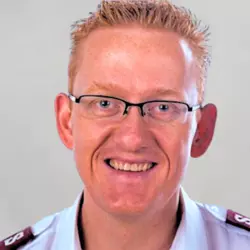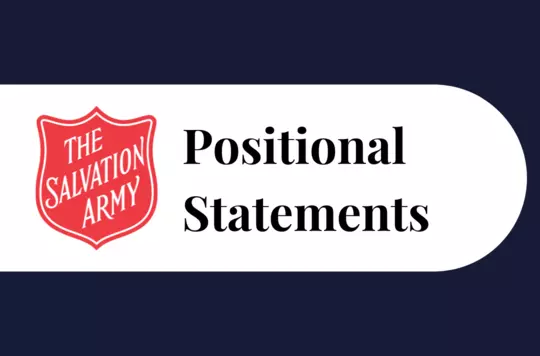16 August 2023
Alcohol-free drinks: When is a beer not a beer?
Captain (Dr) Will Pearson

Captain (Dr) Will Pearson, a member of the Moral and Social Issues Council, considers the rise of alcohol-free drinks in society.
‘It’s OK, all the alcohol gets cooked off.’ How many times have you heard that as you’re looking at a menu with friends from church? Chicken in a white wine sauce, steak and ale pie, fish and chips with beer batter. But what about a sherry trifle – that old chestnut! – or a cheeky liqueur chocolate at Christmas? Well, today, there’s a new dilemma: low and no-alcohol beers.
For some Salvationists, this is a missional opportunity – a chance to connect with a new demographic. What better for a men’s event? ‘Tins and Hymns’, anyone? Or what about creating a venue that is credible enough for teenagers to bring friends to? Or for your new ministry with twenty-somethings?
It’s low alcohol, right? So it fits with our heritage and beliefs. Surely, it’s a rare but brilliant alignment of contemporary culture and Salvationism!
Maybe, maybe not.
Those of us who are soldiers have signed the Soldier’s Covenant. One of the promises made is: ‘I will abstain from alcoholic drink – “intoxicating liquor” for those who signed before 1989 – tobacco, the non-medical use of addictive drugs, gambling, pornography, the occult, and all else that could enslave the body or spirit.’
But what counts as an alcoholic drink?
In the UK, to be described as ‘alcohol-free’, a drink must contain less than 0.05 per cent alcohol. De-alcoholised drinks can contain up to 0.5 per cent, and drinks containing up to 1.2 per cent can be labelled as ‘low alcohol’. An alcohol licence is required for selling beverages containing more than 0.5 per cent. All somewhat confusing.
Can a soldier drink a 0.5 per cent beer? No? What about a glass of fresh orange juice? That’s right: orange juice. Alcohol is created by fermentation, which is a natural process that occurs in much of our food and drink. So regular fresh orange juice often contains up to 0.5 per cent alcohol – does that count as an alcoholic drink? A bread roll is often more than 1 per cent alcohol. And do you ever use red wine vinegar in your salad dressing?
You get the point: legalism to the wording of the Soldier’s Covenant in this instance has the potential to become silly quite quickly. Perhaps we should seek to understand the spirit of those words – what was their purpose?
The Army’s teetotal stance was inspired partly by a 19th-century understanding of holiness and partly by an awareness of the human cost of addiction – look up William Hogarth’s 1751 drawing Gin Lane for a visual reminder.
In the face of such destitution and desperation caused by drink, early Salvationists chose to steer clear. Perhaps they also wanted to demonstrate an alternative lifestyle and avoid being a stumbling block to others (see 1 Corinthians 8:9).
In the health centre where I work, we’ve lost four patients in the past four weeks, three of them due to alcohol – mirroring the experience nationally, where deaths from alcohol are higher than ever and are rising by about 7 per cent per year. Staff members in our Lifehouses and drop-in centres know all too well how dependence on alcohol or other drugs can take everything from you. And for people who are alcohol-dependent, there are reminders everywhere – a bottle of 1.2 per cent beer or even the imagery and branding of a 0 per cent beer could well be a trigger for someone trying to avoid alcohol. So, our covenant made sense historically, and I believe it still fits well today with our experience and our ministry to ‘suffering humanity’.
Personally, I also find it problematic to give our money to ‘Big Alcohol’, the drinks industry that lobbies hard against public health measures that have wide support from health bodies. But then I did have breakfast in a well-known pub chain just this morning, so who am I to judge!
So where does all this leave us?
In all likelihood, no one is going to get drunk on 1.2 per cent beer. And with regards to keeping the Soldier’s Covenant, legalism to its wording is not likely to be helpful here. The other ‘I will’ statements deserve a more equal share of the attention.
In medical ethics, doctors are taught not to think in black and white and instead articulate and weigh up the different arguments. There are potential missional opportunities here but what is right in your context may not be right in mine.
As Christians, it shouldn’t be new to us to seek to discern what is right sincerely and humbly (see Acts 15:28) – seeking to live as disciples and sharing the good news, while also remembering the reality for people who are dependent on alcohol and our colleagues who work with them.
How can you help people experiencing addiction?
If you’re interested in what help you can provide in your corps or centre, email addictionservice@salvationarmy.org.uk for training or guidance on what advice to give, how to run a support group or how to contact your local commissioned drug and alcohol service.
Written by

Captain (Dr) Will Pearson
Assistant Territorial Addictions Officer, THQ
Discover more

Moral and Social Issues Council (Masic)
Helping Salvationists engage in moral and social issues in their communities.

Positional statements
Information and guidance about moral and social issues for members of The Salvation Army.

Social justice and peacemaking
Consider your response to social issues.

Injustice is everywhere. Where do we start?
Major Nick Coke considers how to seek justice in a society longing for reconciliation.